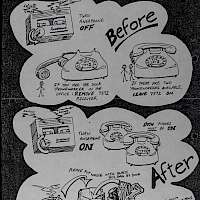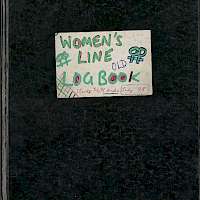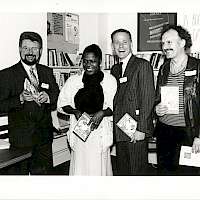London Friend Women’s Line Log Book
By Tim Spencer
Over the years, helplines have provided essential support to many within the LGBTQ+ community. Although general helplines like the Samaritans were available, specialist LGBTQ+ helplines evolved out of the need for LGBTQ+ people to be able to speak to other LGBTQ+ people for advice and guidance. Lesbian helplines evolved out of this same need, for lesbians to be able to speak to other lesbians who understood the issues they faced. Some, like Lesbian Line, were formed by people who had previously volunteered at mixed gender helplines, like the one at London Friend.
An article about lesbian switchboards in Gay News, stated that each lesbian switchboard “has its own way of functioning, though there are basic similarities: e.g. the wide age range of callers; isolation as the constant, underlying cause of virtually every problem; the inevitable obscene crank calls from men. Most of the groups operate as a feminist collective, on a self-help basis”. 1 London Friend operated helplines since its inception in 1972, and analysis of the nature of calls to its helplines in its annual reports for the 1980s reflect Harvey’s findings. Calls ranged from those looking for information, befriending or counselling, to hoax, masturbatory and silent calls. 2 London Friend also ran a separate women’s helpline. In the beginning it was open just one night a week, expanding to two nights a week in 1989. 3
Volunteers operating London Friend’s helplines operated within a framework of support provided by London Friend. A document published for volunteers in December 1992, London Friend’s ‘Befriending Statement and Guidelines’ illustrates the complexities and challenges that helpline workers faced. 4 Some of the dangers of befriending work were caller dependence or callers falling in love with volunteers, and a lack of clarity and boundaries, which could lead to the caller feeling let down or the volunteer feeling trapped. The guidelines encouraged volunteers to talk to their peers should they require help or advice, as well as stressing the importance of documenting all calls in the befriending logbook.
London Friend’s Women’s Line Logbook 1993 -1998, which we found at the Islington Archive offers a fascinating insight into the world of the helpline. 5 This logbook was used between July 1993 to July 1998. The first entry on 29th July 1993, said ‘Wow! A brand new log book and all for us!!’, implying the Women’s Line previously shared a logbook with other London Friend helplines. Volunteers would log the calls they took by hand in the book to update the next shift of volunteers on what had happened that day.
Not only was the logbook used to capture the detail of conversations with callers, but also for the volunteers to communicate operational matters amongst themselves, such as:
Making the rest of the team aware of upcoming time off and holidays
Technology issues and setup relating to the phone and voicemail
Agreeing the staffing rota for the helpline
Discussing agendas for team meetings
The logbook tells us that calls to the Women’s Line were wide-ranging in nature and often highly complex and challenging to deal with. Some were straightforward to deal with, such as enquiries about London Friend services. As this was before the internet, the helpline was a way people could find out where and when groups and events were happening. Hoax and silent callers were a common occurrence. There were repetitive callers falsely claiming victimisation by other service users and volunteers, as well as mastubatory calls (described in the logbook as ‘wank calls’) made by both men and women.
There were also more complex calls to deal with, ranging from parents seeking advice following their child coming out, to troubled or depressed callers struggling with their mental health. Volunteers used the logbook to seek out advice from their colleagues, and discuss specialist organisations they had referred callers to. Throughout the five year duration of the logbook, callers with more complex issues would often call regularly and speak to different volunteers each time they called. The logbook was a crucial resource that enabled volunteers to keep track of the progress of repeat callers and pass messages amongst each other.
In line with London Friend’s befriending guidelines, the volunteers regularly discussed conversations they had found difficult, seeking out support and ideas on how best to manage them. In fact, it appears that the shared responsibility, experience and support amongst the volunteers created a mutual bond and camaraderie. The tone of the messages between them is supportive, caring and lighthearted at times. The logbook also shines a light on the incredible and vital work carried out by LGBTQ+ helpline volunteers, the compassion, kindness and sensitivity required to do the job, and just what a vital resource it was to those in the community who most needed help and support.
Footnotes
- Veronica Harvey, ‘Lesbian Switchboards. You’re only writing about the female angle?’, Gay News, 226, p. 15
- Friend Annual Report 1980, London School of Economics, HCA/FRIEND/1/1
- London Friend Newsletter, 16 October 1989, Islington Local History Centre, Box 1 (Uncatalogued)
- LF Befriending Statement and Guidelines, December 1992, Islington Local History Centre, Box 1 (Uncatalogued)
- London Friend Women’s Line Logbook, July 1993 - July 1998, Islington Local History Centre, Box 1 (Uncatalogued)
Gallery
Bibliography
McCourt, Malcolm. How Can We Help You?. 1 ed., London, Bedford Square Press of the National Council for Voluntary Organisations, 1989, p. 7
Harvey, Veronia. ‘Lesbian Switchboards. You’re only writing about the female angle?’, Gay News, 226, p.15
Friend Annual Report 1980, London School of Economics, HCA/FRIEND/1/1
London Friend Newsletter, 16 October 1989, Islington Local History Centre, Box 1 (Uncatalogued)
LF Befriending Statement and Guidelines, December 1992, Islington Local History Centre, Box 1 (Uncatalogued)
Women’s Line Logbook, July 1993-July 1998, Islington Local History Centre, Box 1 (Uncatalogued



